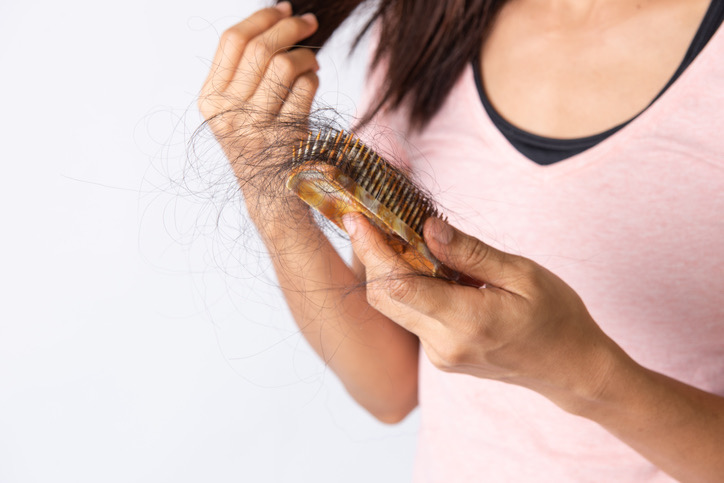9 Things to Know About Female Hair Loss
Hair loss is always distressing, but there can be more reasons for it than you might imagine.

There are many different reasons for female hair loss and that’s why there’s no one treatment that works for everyone.
To find your hair loss solution, you’ll have to do a bit of detective work. I am sharing wisdom from Australian Naturopathic Doctor and hormone expert Lara Briden to help with that, so here’s what you need to know.
Birth control can have an effect
Contraceptive devices such as the Pill, Coil or Implant contain a progestin (synthetic progesterone) that is very similar to testosterone, and so gives male hormone side effects such as acne and hair loss.
Progestins mimic the action of the natural hormone progesterone but are not the same. The most ‘testosterone-like’ progestins are medroxyprogesterone, norgestrel, etonogestrel and levonorgestrel.
Birth control-induced hair loss is gradual, so you might not even notice it for many months (or even years). Your doctor’s solution will be to switch you to different progestin such as drospirenone, but drospirenone-pills have their own problems (depression and blood clots), and they also prevent ovulation, which is the very thing you need to recover your hair.
Ovulation is essential for healthy hair
Your hair loves oestrogen and progesterone, and the only way to make those hormones is to ovulate each month, and to have a natural cycle.
Getting some oestrogen and progesterone is another reason to stop hormonal birth control, but take care: stopping birth control might temporarily worsen hair loss.
Why? Because a sudden hormonal change can trigger hair loss (that’s why hair loss is so common after childbirth). Pill-withdrawal hair loss should improve after a few months, as long as you start to ovulate and have regular cycles.
Rule out PCOS
Polycystic ovarian syndrome (PCOS) is a hormonal condition with a high level of androgens (male hormones) that cause hair loss, acne and hirsutism (facial hair).
If you think you might have PCOS, please speak to your doctor about having a blood test. (PCOS must be diagnosed by blood test—not ultrasound.) Fortunately, PCOS responds well to natural treatment and diet changes.
Check your thyroid
Thyroid disease is another common cause of hair loss. Your doctor will order a basic test called TSH, but it’s not always the most reliable test.
If you have symptoms of thyroid disease, or if you have a family history of thyroid disease, then talk to your doctor about another blood test called ‘thyroid antibodies’. It’s the best marker of autoimmune thyroid disease.
Consider iron
Your hair requires a lot of iron, so no matter what your cause of hair loss (birth control, PCOS, thyroid), you’ll need adequate iron to recover.
Talk to your doctor about a test to establish iron levels. Your serum ferritin should be at least 50 ng/mL. If it’s lower than that, consider supplementing 25 mg of a gentle iron in a liquid form which can be easier to absorb.
Reduce inflammation
Inflammation hyper-sensitises hair follicles to androgens (male hormones), which is why chronic inflammation can cause androgen hypersensitivity or androgenetic alopecia.
A simple way to reduce inflammation is to avoid inflammatory foods such as sugar, wheat and dairy. Also consider your progesterone levels as good ones are needed because this hormone is a natural anti-inflammatory.
Eat more carbs
A low carb diet can make your hypothalamus think you’re starving, which convinces it to shut down ovulation and hormones.
Low calorie and low carb dieting can both result in hair loss in women.
Take zinc
Zinc is good for hair because it promotes ovulation, reduces inflammation, and blocks androgens. Zinc also directly stimulates hair growth.
Common causes of zinc deficiency include a vegetarian diet and hormonal birth control.
The best food sources of zinc are red meat, pumpkin seeds and oysters. If you decide to supplement, then a safe dose is 25 mg per day after food.
Be patient
Even with the best treatment, you can’t expect to see any results for at least three to six months. Why? Because your hair has a telogen (resting) phase, which is like a waiting room.
Once your hair has entered the telogen phase, it is destined to fall two to six months later, no matter what you do. In other words, you have a lot hair in the telogen phase now. Even with the best treatment, all of those hairs are going to fall.
Stay calm, be patient, and stick with your treatment.
Helpful information:
When hair starts thinning, then what can happen is that if progesterone levels fall as a result of lack of ovulation the body responds by increasing its production of the adrenal cortical steroid, androstenedione, an alternative precursor for the production of other adrenal cortical hormones.
Androstenedione conveys some androgenic (male-like-properties) – in this case male pattern hair loss.
If this is what is causing your hair loss, then when progesterone levels are raised by supplementation the androstenedione level will gradually fall, and normal hair growth can eventually resume.
Since hair growth is slow, it may take 4-6 months for the effects to become apparent.
This article can be helpful: https://anna.blog.wellsprings-health.com/top-10-foods-for-healthy-hair/


















